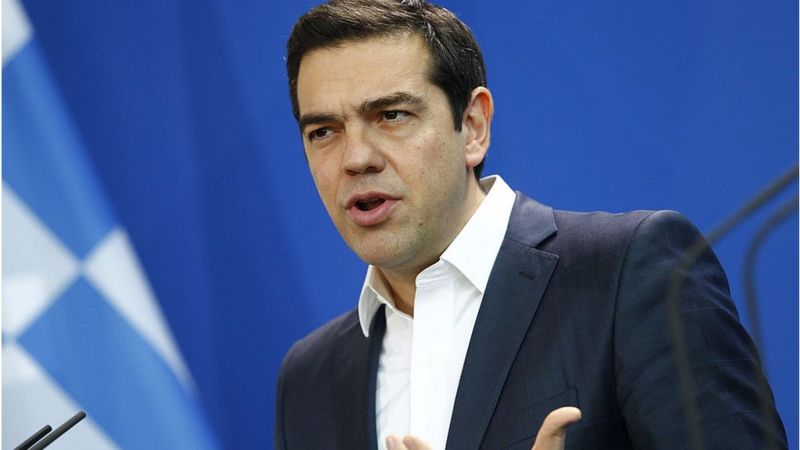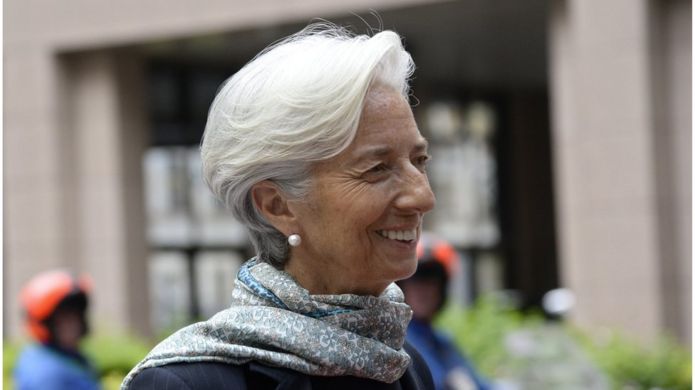
Greek Prime Minister Alexis Tsipras has said IMF demands are blocking the completion of a third bailout
Greece is back in the news after eurozone governments and the International Monetary Fund fell out once again over how to handle the country's bailout.
The IMF says Greece needs more leeway to pay its mountainous debts before further rescue funds can be released.
But the eurozone, which has already given the country significant debt relief, is reluctant to go much further.
With major repayments due later this year, can the two sides come to an agreement before Greece's financial situation becomes untenable?
What is the IMF's position ?
It has long been the IMF's view that Greece needs more debt relief in order to make the government's financial situation sustainable.
The IMF has published its annual assessment of the Greek economy and it said: "Greece cannot grow out of its debt problem. Greece requires substantial debt relief from its European partners to restore debt sustainability."

The IMF, led by Christine Lagarde, says Greece's debt burden could become "explosive"
Eurozone governments have provided some debt relief already, in the form of lower interest rates and extended repayment periods. IMF staff think they need more, although it can take the form of more of the same.
The IMF says there is no need for what it calls an "upfront haircut", a reduction in the principal that has ultimately to be repaid.
There were reports last month that analysis by IMF economists suggested the debt burden would, without relief, become "explosive". That means, on a path of continuous increases (as a percentage of national economic activity).
What about eurozone governments?
Dutch Finance Minister Jerome Dijsselbloem, who chairs eurozone meetings, described the IMF's view as "unnecessarily pessimistic".
Several have domestic political problems about providing debt relief. It doesn't go down well rescuing governments of other countries from what are seen as the consequences of their own irresponsibility.
Some also worry that debt relief would take the pressure off Greece to complete difficult reforms. Last year, German Finance Minister Wolfgang Schaeuble said: "Anyone who now speaks about debt relief for Greece does not strengthen those who want reforms."
There have been reports of disagreements within the German coalition government. Germany is the key player (though not the only one) within the eurozone that has been unenthusiastic about debt relief.
The business newspaper Handelsblatt reported that Sigmar Gabriel, the German vice-chancellor, had expressed "great concern" and called for the German government to moderate its demands for the Greek government's financial targets.
Mr Gabriel represents the Social Democrats, the junior party in the ruling collation. His comments are seen as a criticism of Mr Schaeuble, who leads Germany's input into the negotiations with Greece and is a member of the leading party in the government, the Christian Democratic Union.
Are there divisions within the IMF?
Unusually, diverging views within the IMF's Board have emerged publicly. When the IMF conducts annual reviews of countries, it also publishes a brief summary of the Board's discussion.
On this occasion, the document says "most directors" thought there would be a need for further debt relief. There were several other points where that phrase "most directors" cropped up. Usually these reports convey an impression (justified or not) of consensus.
There is no indication of which directors did not share the view on debt relief, but it's not unreasonable to hazard a guess that they were among those who represent eurozone governments.
The Board is made up of representatives of the member countries, plus Managing Director Christine Lagarde.
Is the situation coming to crisis point again?
Not immediately. The key date is July. That's when Greece is due to make debt repayments, to creditors in both private and public sectors (notably the European Central Bank).
To make those payments, Greece will need the next payment of its current (third) bailout. It won't get that until the review of the programme - by the IMF, the European Commission and the ECB, known as the Troika - is completed.
That has been delayed, as Greece has been unable to convince them that it has made enough progress with reforms intended to support long-term economic growth and stable government finances.
Does the IMF's view matter?
The IMF is not contributing financially to the third bailout. It provides advice and did put money into the first two financial rescues. The eurozone would like to have the IMF's full backing. It would make the exercise look more credible.
And what about political developments across the eurozone?
The situation is further complicated by forthcoming elections in Eurozone countries. In France, Marine Le Pen's National Front and in the Netherlands, Geert Wilders' Freedom Party are both hostile to the European Union and have both criticised the bailout. Germany has elections later in the year.
No comments:
Post a Comment